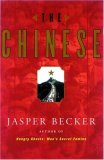Summary | Excerpt | Reviews | Readalikes | Genres & Themes | Author Bio

Critics' Opinion:
Readers' Opinion:
First Published:
Dec 2000, 304 pages
Paperback:
Feb 2002, 493 pages
In the reign of the Manchu emperor Qianlong (1736-95), when China reached its furthest limits, its wealth and stability triggered a huge increase in the population which rose from 143 million in 1741 to 432 million in 1851. But in Qianlong's reign, the seeds of the Qing dynasty's downfall were also sown. Western powers began to make their presence felt. In 1793 Qianlong received and rejected the embassy of Lord Macartney who proposed state-to-state diplomatic relations and free trade between Britain and China. Foreign traders remained confined to a small strip of land outside Canton (now Guangzhou). However, increasing pressure by British merchants to open up China to foreign trade eventually resulted in the First Opium War (1840-2) and the humiliation of China by a foreign power.
Thereafter China was steadily forced to grant further concessions to foreigners and to open its doors to the West. Peace treaties, now known by the Chinese as 'unequal treaties', at the conclusion of the First Opium War and a second war that broke out in 1858, ceded the island of Hong Kong and the peninsula of Kowloon to Britain, provided for the establishment of treaty ports within China, and permitted the opening of foreign embassies in Beijing.
In 1850, China was shaken by the outbreak of the Taiping Rebellion, led by Hong Xiuchuan who proclaimed himself the brother of Jesus Christ. In the protracted war that followed, 20 million Chinese lost their lives. Uprisings in many other parts of the empire by Muslims and tribes in Yunnan and Guizhou in the south further sapped the strength of the empire, and corruption became rife. Still, the empire held together, despite the shortage of tax revenues and the growing inferiority of its armies. However, in 1894, the Japanese inflicted a crushing defeat on the Chinese army and navy over Korea and at last the Emperor Guangxu asked a group of scholars to modernize the country by following the Japanese and Russian models. The so-called Hundred Days Reform movement of 1898 ended when the Empress Dowager Cixi imprisoned the Emperor and had some of the reformers executed. Thereafter, reformers fled abroad and sought support among the overseas Chinese and the growing number of students studying abroad who formed 'Revive China' groups. Among those fleeing was Sun Yat-sen, the father of the Republican movement in China.
An attempt by the Empress Dowager Cixi in 1900 to use another rebellion, that of the Boxers, to expel foreigners from China failed, and in retaliation Western powers and Japan imposed heavy reparations on China. Tentative reforms, including the abolition of the civil service exams in 1905, were then made but by now the Qing dynasty had, in the eyes of many, lost its mandate to rule. In 1911, following an uprising that began in Wuhan, the young emperor was forced to abdicate and a republic was declared.
After the fall of the last imperial dynasty the debate about how to create a modern Western state intensified and the merits of Westernization, science, technology, democracy, and the rule of law were hotly debated, a debate that culminated in the May Fourth movement of 1919. The date refers to student protests in Beijing over a decision at Versailles at the end of the First World War to give Germany's concessions in China to Japan, but the term is more widely used to describe a movement to modernize Chinese culture. This included writing in the vernacular and abandoning the use of ancient Chinese which was as hard for the majority of people to understand as Latin would be today in the West. The two slogans of the movement -- democracy and science -- are still high on the agenda eighty years later.
At the end of the nineteenth century China had been in grave danger of being dismembered by the colonial powers including Japan, and after the collapse of the imperial system Mongolia, Tibet, Yunnan and other vassal states broke away, declaring themselves no longer bound to China. In the rest of the country, in the absence of control at the centre, warlords now held sway. In imperial China loyalty to the ruling dynasty had bound the multiracial empire together. However under the Manchu Qing dynasty Han Chinese were treated as a subject people and forced to wear a pigtail or queue. When Sun Yat-sen returned to China in 1911 and was elected as the first President of the Republic of China he articulated a new nationalism intended to revive the Chinese race. A race which had once been the most advanced had degenerated. Sun believed that it must be revived or face extinction in what he regarded as a global struggle for racial superiority. This belief in the need to regenerate China in the face of a foreign threat to the Chinese race still has many adherents both on the mainland and in Taiwan. At the same time, however, many Chinese were being educated at foreign-run schools within China or had been sent abroad to learn Western methods. The new nationalism and the desire to learn from abroad coexisted uneasily.
Copyright © 2001 by Jasper Becker.





The House on Biscayne Bay
by Chanel Cleeton
As death stalks a gothic mansion in Miami, the lives of two women intertwine as the past and present collide.

The Flower Sisters
by Michelle Collins Anderson
From the new Fannie Flagg of the Ozarks, a richly-woven story of family, forgiveness, and reinvention.

The Funeral Cryer by Wenyan Lu
Debut novelist Wenyan Lu brings us this witty yet profound story about one woman's midlife reawakening in contemporary rural China.
Your guide toexceptional books
BookBrowse seeks out and recommends the best in contemporary fiction and nonfiction—books that not only engage and entertain but also deepen our understanding of ourselves and the world around us.